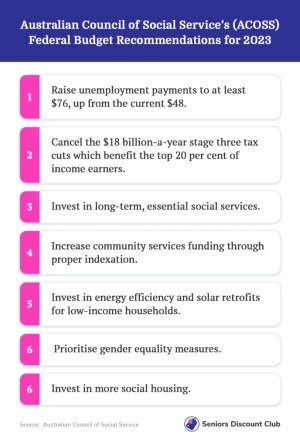Mounting Pressure on Government for Cost of Living Relief - Will There be a Break in the Federal Budget?
By
- Replies 45
As the cost of living in Australia continues to rise, many people need help to make ends meet.
From increasing utility bills to rising food and housing costs, everything is getting more expensive by the day.
In the face of these challenges, many Australians are looking to the government for help in the form of relief programs and assistance.
With mounting pressure on the government to provide relief, the question on everyone's mind is whether these programs will be enough to make a real difference.
As prices continue to climb and wages fail to keep up, it's clear that something needs to be done.
The upcoming federal budget holds a lot of hope for many Australians, especially those struggling with cost-of-living pressures.

Leading welfare organisation, the Australian Council of Social Services (ACOSS), have released their budget submission, which calls on the government to provide more support for people on the lowest incomes.
ACOSS demanded that the government increase the number of unemployment benefits granted to recipients from the current $48 to at least $76. This would likely have flow-on effects for other payments such as the pension.
The social advocacy organisation also urged the government to take advantage of the budget to set the foundation for a more inclusive and prosperous future by investing in essential social services that will improve the esteem and quality of life of people from all walks of life, from the lowest income earners to the most privileged.
Cassandra Goldie, the head of ACOSS, described it as a disgrace that despite Australia being one of the wealthiest nations in the world, its unemployment benefits are among the lowest when compared to the rest of the OECD.
She pointed out that it was the right time for the government to step in and address the issues regarding the adequacy of the country's most essential social security systems to improve the quality of life and productivity of the citizens.
Ms Goldie remarked: ‘The government has the tools to build a more equal Australia ... every budget is about choice, and it does actually set up the values of the country.’
‘We very strongly think the budget should be about tackling inflation (and) we should be focusing on measures that are not harming those who are most at risk.’
Goldie also said that many Australians are taking measures that go beyond their standard level of living to make ends meet.
'This is not about the cost of a cup of coffee; this is about the essentials of life,' she said.
ACOSS also suggested that the government achieve higher levels of sufficient funding by halting the $18 billion per year stage three tax cuts, which they claimed only to benefit the wealthiest 20 per cent of Australian citizens.
The contentious tax cuts, which are set to take effect starting in 2024, have been a hot topic of debate in the country, with some believing that it would benefit the middle and working class while others saying that it would only help the rich.
The group also advocated for increased funding for community services via proper indexation and investments in solar and energy efficiency for low-income households.
Goldie emphasised the need for the budget to prioritise gender equality measures and dedicate more funding to social housing.
She said: 'This is a budget we want to see that actually speaks to the government’s commitment that nobody is going to be left behind.’
In January, Treasurer Jim Chalmers said he was aware of cost-of-living pressures and plans to provide 'responsible cost-of-living relief' in the upcoming budget.
'My job is to try and make it all add up in the context of a trillion dollars of debt and all of those other budget pressures,' he remarked.
'We will do what we can to provide responsible cost-of-living relief, electricity bills, cheaper early childhood education, a pay rise for aged care workers; these will all be in the Budget in May.'
‘If there are other steps that we can consider and that we can afford, then obviously, we’ll contemplate that as well.’

Here at the Seniors Discount Club, we make it our mission to keep our members updated with all of the latest news and developments from the upcoming federal budget.
We also previously shared an article where we detail some of the government relief programs that you can take advantage of.
What are your thoughts on ACOSS' proposal? What measures would you like to see in the upcoming federal budget to make your life easier? Let us know in the comments below!
From increasing utility bills to rising food and housing costs, everything is getting more expensive by the day.
In the face of these challenges, many Australians are looking to the government for help in the form of relief programs and assistance.
With mounting pressure on the government to provide relief, the question on everyone's mind is whether these programs will be enough to make a real difference.
As prices continue to climb and wages fail to keep up, it's clear that something needs to be done.
The upcoming federal budget holds a lot of hope for many Australians, especially those struggling with cost-of-living pressures.

Advocacy groups are urging the government to consider their recommendations for the upcoming federal budget. Credit: Shutterstock.
Leading welfare organisation, the Australian Council of Social Services (ACOSS), have released their budget submission, which calls on the government to provide more support for people on the lowest incomes.
ACOSS demanded that the government increase the number of unemployment benefits granted to recipients from the current $48 to at least $76. This would likely have flow-on effects for other payments such as the pension.
The social advocacy organisation also urged the government to take advantage of the budget to set the foundation for a more inclusive and prosperous future by investing in essential social services that will improve the esteem and quality of life of people from all walks of life, from the lowest income earners to the most privileged.
Cassandra Goldie, the head of ACOSS, described it as a disgrace that despite Australia being one of the wealthiest nations in the world, its unemployment benefits are among the lowest when compared to the rest of the OECD.
She pointed out that it was the right time for the government to step in and address the issues regarding the adequacy of the country's most essential social security systems to improve the quality of life and productivity of the citizens.
Ms Goldie remarked: ‘The government has the tools to build a more equal Australia ... every budget is about choice, and it does actually set up the values of the country.’
‘We very strongly think the budget should be about tackling inflation (and) we should be focusing on measures that are not harming those who are most at risk.’
Goldie also said that many Australians are taking measures that go beyond their standard level of living to make ends meet.
'This is not about the cost of a cup of coffee; this is about the essentials of life,' she said.
ACOSS also suggested that the government achieve higher levels of sufficient funding by halting the $18 billion per year stage three tax cuts, which they claimed only to benefit the wealthiest 20 per cent of Australian citizens.
The contentious tax cuts, which are set to take effect starting in 2024, have been a hot topic of debate in the country, with some believing that it would benefit the middle and working class while others saying that it would only help the rich.
The group also advocated for increased funding for community services via proper indexation and investments in solar and energy efficiency for low-income households.
Goldie emphasised the need for the budget to prioritise gender equality measures and dedicate more funding to social housing.
She said: 'This is a budget we want to see that actually speaks to the government’s commitment that nobody is going to be left behind.’
In January, Treasurer Jim Chalmers said he was aware of cost-of-living pressures and plans to provide 'responsible cost-of-living relief' in the upcoming budget.
'My job is to try and make it all add up in the context of a trillion dollars of debt and all of those other budget pressures,' he remarked.
'We will do what we can to provide responsible cost-of-living relief, electricity bills, cheaper early childhood education, a pay rise for aged care workers; these will all be in the Budget in May.'
‘If there are other steps that we can consider and that we can afford, then obviously, we’ll contemplate that as well.’
Key Takeaways
- The Australian Council of Social Services (ACOSS) has released its budget submission, calling for people on the lowest incomes to be prioritised.
- ACOSS urges the government to use the upcoming budget to lay the foundations for a more inclusive future.
- ACOSS is calling for measures to be taken to increase community services funding, with specific investments in energy efficiency and solar retrofits for low-income households.
- Treasurer Jim Chalmers has said the government will do what it can to provide responsible cost-of-living relief in the upcoming budget.
Here at the Seniors Discount Club, we make it our mission to keep our members updated with all of the latest news and developments from the upcoming federal budget.
We also previously shared an article where we detail some of the government relief programs that you can take advantage of.
What are your thoughts on ACOSS' proposal? What measures would you like to see in the upcoming federal budget to make your life easier? Let us know in the comments below!
Last edited by a moderator:









